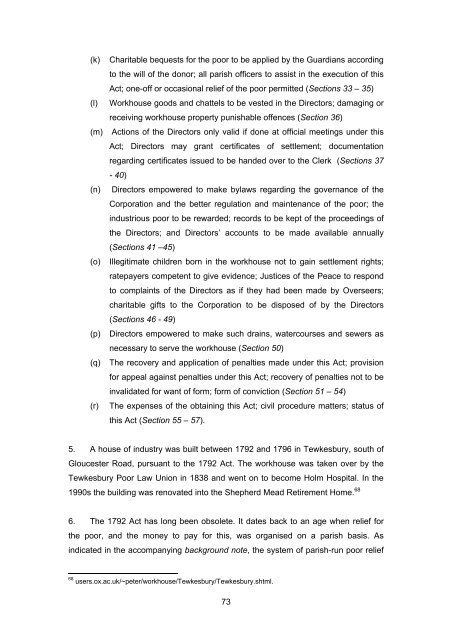Poor Relief - Law Commission
Poor Relief - Law Commission
Poor Relief - Law Commission
You also want an ePaper? Increase the reach of your titles
YUMPU automatically turns print PDFs into web optimized ePapers that Google loves.
(k) Charitable bequests for the poor to be applied by the Guardians according<br />
to the will of the donor; all parish officers to assist in the execution of this<br />
Act; one-off or occasional relief of the poor permitted (Sections 33 – 35)<br />
(l) Workhouse goods and chattels to be vested in the Directors; damaging or<br />
receiving workhouse property punishable offences (Section 36)<br />
(m) Actions of the Directors only valid if done at official meetings under this<br />
Act; Directors may grant certificates of settlement; documentation<br />
regarding certificates issued to be handed over to the Clerk (Sections 37<br />
- 40)<br />
(n) Directors empowered to make bylaws regarding the governance of the<br />
Corporation and the better regulation and maintenance of the poor; the<br />
industrious poor to be rewarded; records to be kept of the proceedings of<br />
the Directors; and Directors’ accounts to be made available annually<br />
(Sections 41 –45)<br />
(o) Illegitimate children born in the workhouse not to gain settlement rights;<br />
ratepayers competent to give evidence; Justices of the Peace to respond<br />
to complaints of the Directors as if they had been made by Overseers;<br />
charitable gifts to the Corporation to be disposed of by the Directors<br />
(Sections 46 - 49)<br />
(p) Directors empowered to make such drains, watercourses and sewers as<br />
necessary to serve the workhouse (Section 50)<br />
(q) The recovery and application of penalties made under this Act; provision<br />
for appeal against penalties under this Act; recovery of penalties not to be<br />
invalidated for want of form; form of conviction (Section 51 – 54)<br />
(r) The expenses of the obtaining this Act; civil procedure matters; status of<br />
this Act (Section 55 – 57).<br />
5. A house of industry was built between 1792 and 1796 in Tewkesbury, south of<br />
Gloucester Road, pursuant to the 1792 Act. The workhouse was taken over by the<br />
Tewkesbury <strong>Poor</strong> <strong>Law</strong> Union in 1838 and went on to become Holm Hospital. In the<br />
1990s the building was renovated into the Shepherd Mead Retirement Home. 68<br />
6. The 1792 Act has long been obsolete. It dates back to an age when relief for<br />
the poor, and the money to pay for this, was organised on a parish basis. As<br />
indicated in the accompanying background note, the system of parish-run poor relief<br />
68 users.ox.ac.uk/~peter/workhouse/Tewkesbury/Tewkesbury.shtml.<br />
73
















